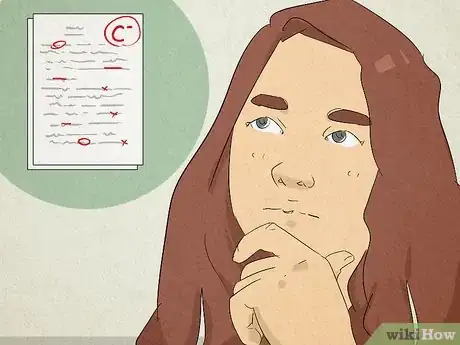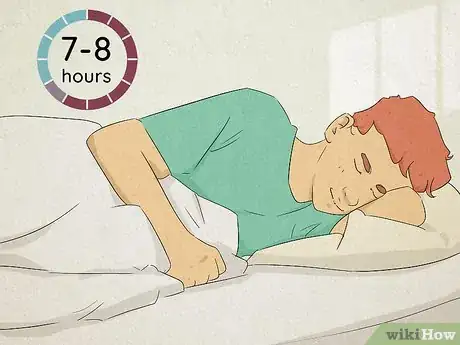This article was co-authored by Samantha Fox, MS, LMFT. Samantha Fox is a Marriage & Family Therapist in private practice in New York, New York. With over a decade of experience, Samantha specializes in relationship, sexuality, identity, and family conflicts. She also advises on life transitions for individuals, couples, and families. She holds both a Master’s degree and a Marriage and Family Therapy License. Samantha is trained in Internal Family Systems (IFS), Accelerated Experiential Dynamic Psychotherapy (AEDP), Emotion Focused Couples Therapy (EFT), and Narrative Therapy.
There are 8 references cited in this article, which can be found at the bottom of the page.
This article has been viewed 341,082 times.
Everyone needs a good night's sleep, but sometimes a dream can be so disturbing that it makes it hard to get back to sleep. Some especially bad nightmares are so disturbing that they seem to haunt you even when you're awake, affecting the quality of your daily life. Fortunately, there are many things you can do to help yourself forget a bad dream and reduce the frequency of nightmares when you sleep. Try some of the tips and tricks on this list to see what works for you.
Steps
Expert Q&A
Did you know you can get expert answers for this article?
Unlock expert answers by supporting wikiHow
-
QuestionWhy do we have bad dreams?
 Samantha Fox, MS, LMFTSamantha Fox is a Marriage & Family Therapist in private practice in New York, New York. With over a decade of experience, Samantha specializes in relationship, sexuality, identity, and family conflicts. She also advises on life transitions for individuals, couples, and families. She holds both a Master’s degree and a Marriage and Family Therapy License. Samantha is trained in Internal Family Systems (IFS), Accelerated Experiential Dynamic Psychotherapy (AEDP), Emotion Focused Couples Therapy (EFT), and Narrative Therapy.
Samantha Fox, MS, LMFTSamantha Fox is a Marriage & Family Therapist in private practice in New York, New York. With over a decade of experience, Samantha specializes in relationship, sexuality, identity, and family conflicts. She also advises on life transitions for individuals, couples, and families. She holds both a Master’s degree and a Marriage and Family Therapy License. Samantha is trained in Internal Family Systems (IFS), Accelerated Experiential Dynamic Psychotherapy (AEDP), Emotion Focused Couples Therapy (EFT), and Narrative Therapy.
Licensed Therapist
-
QuestionWhat do my dreams mean?
 Samantha Fox, MS, LMFTSamantha Fox is a Marriage & Family Therapist in private practice in New York, New York. With over a decade of experience, Samantha specializes in relationship, sexuality, identity, and family conflicts. She also advises on life transitions for individuals, couples, and families. She holds both a Master’s degree and a Marriage and Family Therapy License. Samantha is trained in Internal Family Systems (IFS), Accelerated Experiential Dynamic Psychotherapy (AEDP), Emotion Focused Couples Therapy (EFT), and Narrative Therapy.
Samantha Fox, MS, LMFTSamantha Fox is a Marriage & Family Therapist in private practice in New York, New York. With over a decade of experience, Samantha specializes in relationship, sexuality, identity, and family conflicts. She also advises on life transitions for individuals, couples, and families. She holds both a Master’s degree and a Marriage and Family Therapy License. Samantha is trained in Internal Family Systems (IFS), Accelerated Experiential Dynamic Psychotherapy (AEDP), Emotion Focused Couples Therapy (EFT), and Narrative Therapy.
Licensed Therapist Dreams are rarely a literal reflection of what is to come or what has already happened. Instead of taking a dream as literal, try being more curious about the feelings of the dream, and make more space in your conscious life to give that feeling some attention. This can be through journaling, talking to loved ones, or therapy.
Dreams are rarely a literal reflection of what is to come or what has already happened. Instead of taking a dream as literal, try being more curious about the feelings of the dream, and make more space in your conscious life to give that feeling some attention. This can be through journaling, talking to loved ones, or therapy.
References
- ↑ https://www.refinery29.com/en-us/nightmare-bad-dreams-coping-techniques
- ↑ https://www.lscft.nhs.uk/media/Publications/Traumatic-Stress-Service/WEBSITE%20LEAFLETS/LSCFT%20Managing%20Disturbing%20Dreams%20and%20Nightmares.doc.pdf
- ↑ https://healthywa.wa.gov.au/Articles/N_R/Nightmares-and-flashbacks
- ↑ https://parents.actionforchildren.org.uk/sleep/activity-use-mindfulness-to-soothe-nightmares/
- ↑ https://healthywa.wa.gov.au/Articles/N_R/Nightmares-and-flashbacks
- ↑ https://www.refinery29.com/en-us/nightmare-bad-dreams-coping-techniques
- ↑ https://healthywa.wa.gov.au/Articles/N_R/Nightmares-and-flashbacks
- ↑ https://healthywa.wa.gov.au/Articles/N_R/Nightmares-and-flashbacks
- ↑ Samantha Fox, MS, LMFT. Marriage & Family Therapist. Expert Interview. 19 January 2021.
- ↑ Samantha Fox, MS, LMFT. Marriage & Family Therapist. Expert Interview. 19 January 2021.
- ↑ https://www.psychologytoday.com/us/blog/fulfillment-any-age/201311/five-steps-conquering-nightmares
- ↑ https://kidshealth.org/en/teens/expert-nightmares.html
- ↑ https://kidshealth.org/en/teens/expert-nightmares.html
- ↑ https://kidshealth.org/en/teens/expert-nightmares.html
- ↑ https://my.clevelandclinic.org/health/articles/14297-nightmares-in-children
About This Article
Sometimes a dream is so upsetting that it makes going back to sleep nearly impossible, but luckily there are many things you can do to help forget a bad dream and prevent it from reoccurring. If you wake up from a bad dream, immediately turn your mind away from it and latch on to something real, like thinking about your family or your pets. You’ll also want to calm your body and mind by taking some deep belly breaths. While you work on relaxing, try repeating a calming phrase, like “You’re awake and safe.” The next day, focus on enjoyable things, like reading, calling friends, or watching TV, especially if the bad dream continues to bother you. You can also try talking to a friend or family member about the dream to get it off your chest. The next night, do your best to relax before bed, so try reading or watching a light-hearted book or show, taking a hot bath, or massaging your feet with scented oils. To learn how to adjust your sleep environment to prevent bad dreams, keep reading!











































































Medical Disclaimer
The content of this article is not intended to be a substitute for professional medical advice, examination, diagnosis, or treatment. You should always contact your doctor or other qualified healthcare professional before starting, changing, or stopping any kind of health treatment.
Read More...